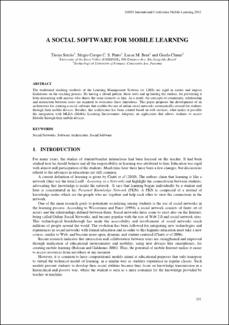El sistema se apagará debido a tareas habituales de mantenimiento. Por favor, guarde su trabajo y desconéctese.
A social software for mobile learning
| dc.contributor.author | Serrão, Tássia | |
| dc.contributor.author | Crespo, Sérgio | |
| dc.contributor.author | Braz, Lucas | |
| dc.contributor.author | Clunie, Gisela | |
| dc.date.accessioned | 2017-07-31T14:06:28Z | |
| dc.date.accessioned | 2017-07-31T14:06:28Z | |
| dc.date.available | 2017-07-31T14:06:28Z | |
| dc.date.available | 2017-07-31T14:06:28Z | |
| dc.date.issued | 2012-07-04 | |
| dc.date.issued | 2012-07-04 | |
| dc.identifier.uri | http://ridda2.utp.ac.pa/handle/123456789/2348 | |
| dc.identifier.uri | http://ridda2.utp.ac.pa/handle/123456789/2348 | |
| dc.description | The traditional teaching methods of the Learning Management Systems (or LMS) are rigid in nature and impose limitations on the teaching process. By having a closed pattern, these tools end up hurting the student, for preventing it from interacting with anyone who shares the same interests as him. As a result, the concepts of community, relationship and interaction between users are required to overcome these limitations. This paper proposes the development of an architecture for creating a social software that enables the use of online social networks automatically created for students through their mobile devices. Besides, this architecture has been created based on web services, what makes it possible the integration with MLEA (Mobile Learning Environment Adapter), an application that allows students to access Moodle through their mobile devices. | en_US |
| dc.description.abstract | The traditional teaching methods of the Learning Management Systems (or LMS) are rigid in nature and impose limitations on the teaching process. By having a closed pattern, these tools end up hurting the student, for preventing it from interacting with anyone who shares the same interests as him. As a result, the concepts of community, relationship and interaction between users are required to overcome these limitations. This paper proposes the development of an architecture for creating a social software that enables the use of online social networks automatically created for students through their mobile devices. Besides, this architecture has been created based on web services, what makes it possible the integration with MLEA (Mobile Learning Environment Adapter), an application that allows students to access Moodle through their mobile devices. | en_US |
| dc.format | application/pdf | |
| dc.language | eng | |
| dc.language.iso | eng | en_US |
| dc.rights | https://creativecommons.org/licenses/by-nc-sa/4.0/ | |
| dc.rights | info:eu-repo/semantics/openAccess | |
| dc.subject | social networks | en_US |
| dc.subject | software architecture | en_US |
| dc.subject | social software | en_US |
| dc.subject | social networks | |
| dc.subject | software architecture | |
| dc.subject | social software | |
| dc.title | A social software for mobile learning | en_US |
| dc.type | info:eu-repo/semantics/article | |
| dc.type | info:eu-repo/semantics/publishedVersion |
